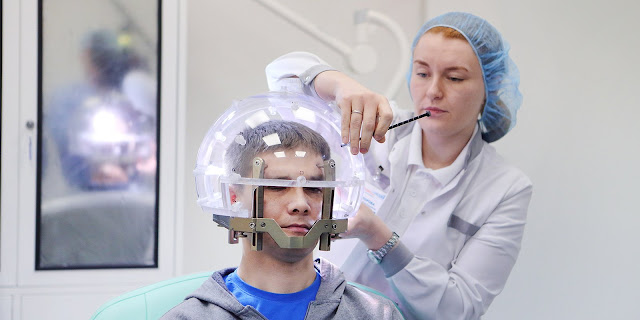Gamma Knife is most commonly used to treat the Brain tumor ,Acoustic neuroma , and many more

What Is Gamma Knife Surgery?
Gamma Knife surgery is a non-invasive, computer-assisted procedure that delivers highly concentrated radiation to brain tumours and lesions. Brain tumours, arteriovenous malformations, trigeminal neuralgia, acoustic neuroma, and tremors are all treated with Gamma Knife surgery.
What conditions are treated using Gamma Knife surgery?
What conditions are treated using Gamma Knife surgery?
- Several brain problems can be treated using Gamma Knife surgery, including:
- Brain metastases, pituitary adenomas, pinealomas, craniopharyngiomas, meningiomas, chordomas, chondrosarcomas, and glial tumours are all examples of brain tumours (both malignant and benign).
- Acoustic neuroma (vestibular schwannomas) is a benign tumour that forms around the balance and hearing nerves that connect the inner ear to the brain.
- AVMs (arteriovenous malformations) are tangles of blood vessels that are abnormally knotted.
- Tremors can be caused by a variety of illnesses, such as essential tremor or Parkinson's disease.
- Trigeminal neuralgia is a chronic illness that affects a nerve in the face and causes excruciating pain.
- Epilepsy comes in a variety of forms.
If you have a brain lesion or tumour that regular surgery can't reach, or if you can't have surgery owing to your condition or age, the Gamma Knife may be useful. To inhibit tumour regrowth, it can also be used in conjunction with standard surgery. The Gamma Knife is also employed in the treatment of specific illnesses that demand immediate attention.
Before the Gamma Knife surgery, what happens?
- Review by a physician
- Your neurosurgeon will take down your medical history and conduct a thorough physical examination. You might be subjected to additional exams.
- If you have a heart pacemaker, a brain aneurysm clip, an implanted medication pump, an implanted nerve stimulator, metal implants, metal from trauma, a cochlear implant, spine stabilisation hardware, severe lung disease, esophageal reflux, or are unable to lay flat on your back for 30 to 60 minutes, tell your doctor.
- If you are allergic or sensitive to any drugs, latex, tape, contrast dyes, iodine, or general or local anaesthetic agents, tell your doctor.


Comments
Post a Comment